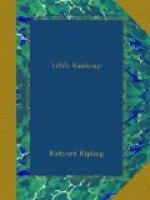The third man drank his cocktail and spoke no word. He was the strategist, but unfortunately his knowledge of life was limited. He picked a letter from his breast-pocket and threw it across the table. That epistle to the heathen contained some very concise directions from the First Three in New York. It said—
’The boom in black iron has already affected the eastern markets, where our agents have been forcing down the English-held stock among the smaller buyers who watch the turn of shares. Any immediate operations, such as western bears, would increase their willingness to unload. This, however, cannot be expected till they see clearly that foreign iron-masters are witting to co-operate. Mulcahy should be dispatched to feel the pulse of the market, and act accordingly. Mavericks are at present the best for our purpose.—P.D.Q.’
As a message referring to an iron crisis in Pennsylvania, it was interesting, if not lucid. As a new departure in organised attack on an outlying English dependency, it was more than interesting.
The second man read it through and murmured—
’Already? Surely they are in too great a hurry. All that Dhulip Singh could do in India he has done, down to the distribution of his photographs among the peasantry. Ho! Ho! The Paris firm arranged that, and he has no substantial money backing from the Other Power. Even our agents in India know he hasn’t. What is the use of our organisation wasting men on work that is already done? Of course the Irish regiments in India are half mutinous as they stand.’
This shows how near a lie may come to the truth. An Irish regiment, for just so long as it stands still, is generally a hard handful to control, being reckless and rough. When, however, it is moved in the direction of musketry-firing, it becomes strangely and unpatriotically content with its lot. It has even been heard to cheer the Queen with enthusiasm on these occasions.
But the notion of tampering with the army was, from the point of view of Tehama Street, an altogether sound one. There is no shadow of stability in the policy of an English Government, and the most sacred oaths of England would, even if engrossed on vellum, find very few buyers among colonies and dependencies that have suffered from vain beliefs. But there remains to England always her army. That cannot change except in the matter of uniform and equipment. The officers may write to the papers demanding the heads of the Horse Guards in default of cleaner redress for grievances; the men may break loose across a country town and seriously startle the publicans; but neither officers nor men have it in their composition to mutiny after the continental manner. The English people, when they trouble to think about the army at all, are, and with justice, absolutely assured that it is absolutely trustworthy. Imagine for a moment their emotions on realising that such and such a regiment was in open revolt from causes directly due to England’s management of Ireland. They would probably send the regiment to the polls forthwith and examine their own consciences as to their duty to Erin; but they would never be easy any more. And it was this vague, unhappy mistrust that the I. A. A. were labouring to produce.




